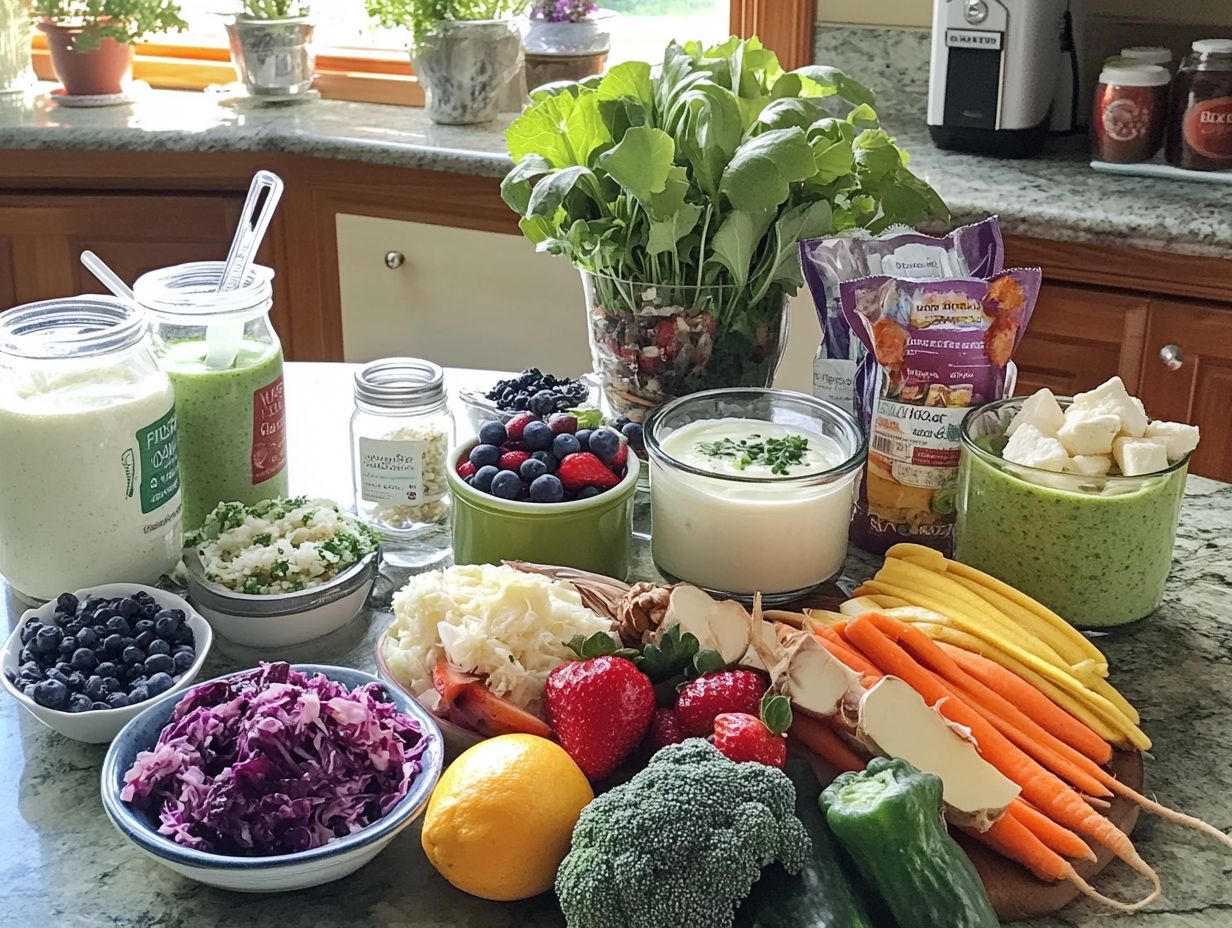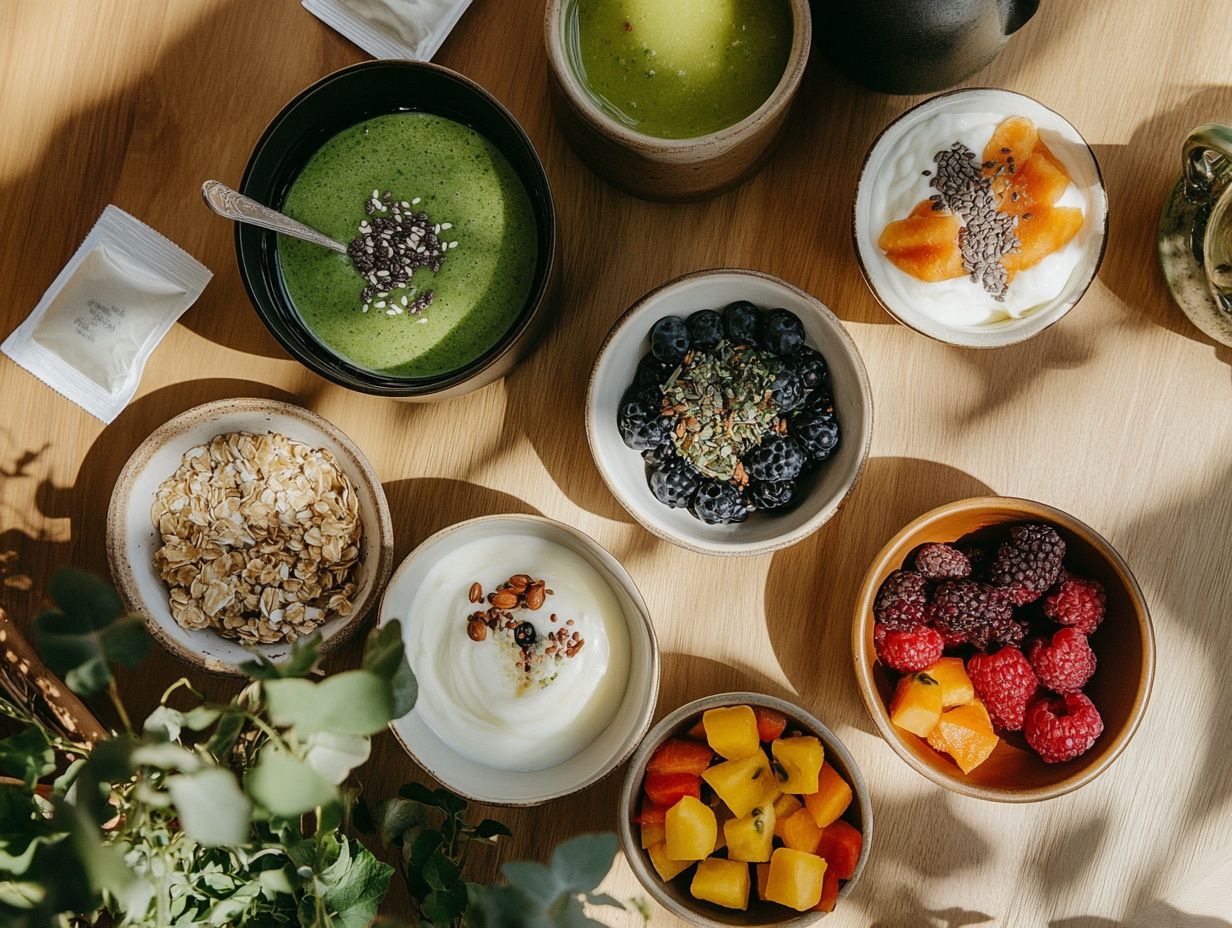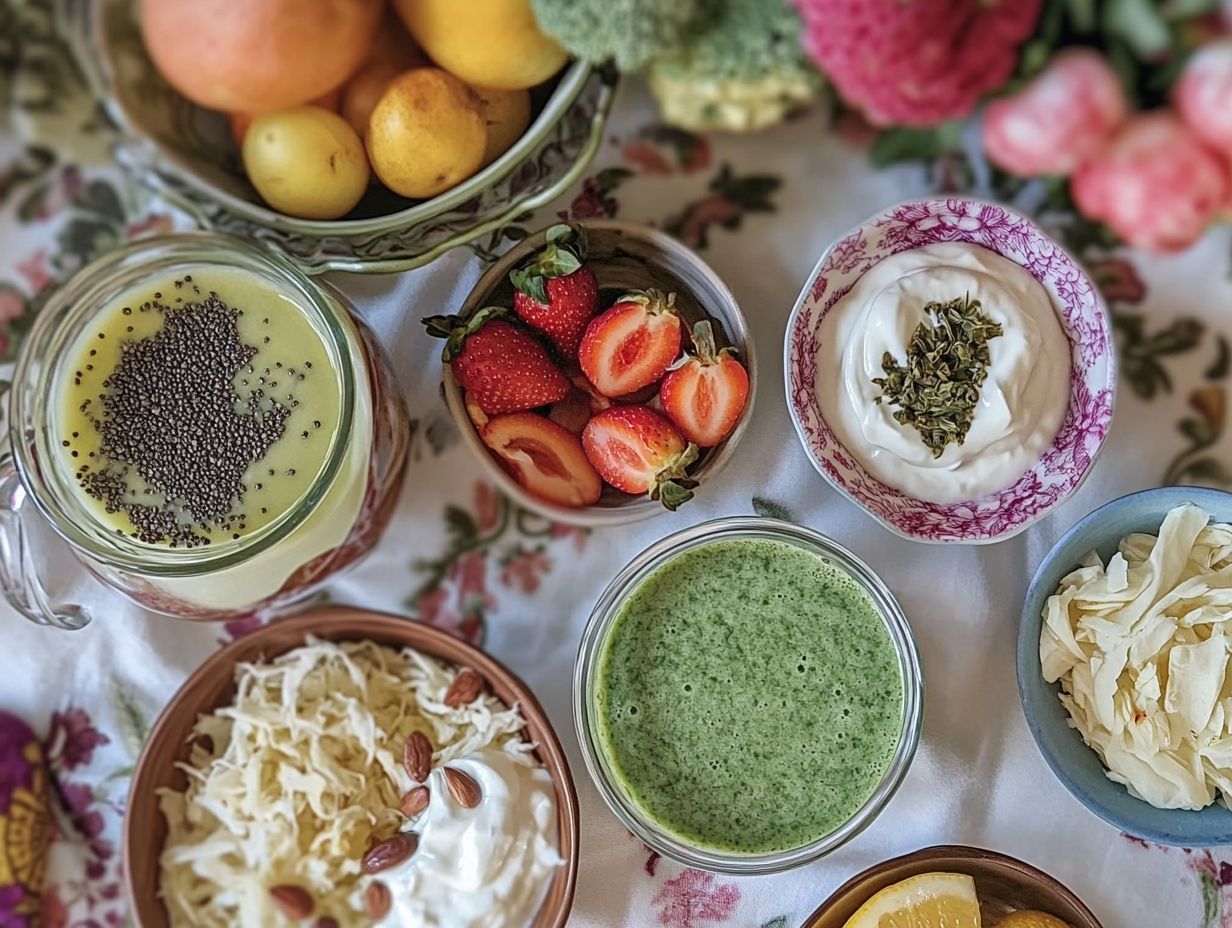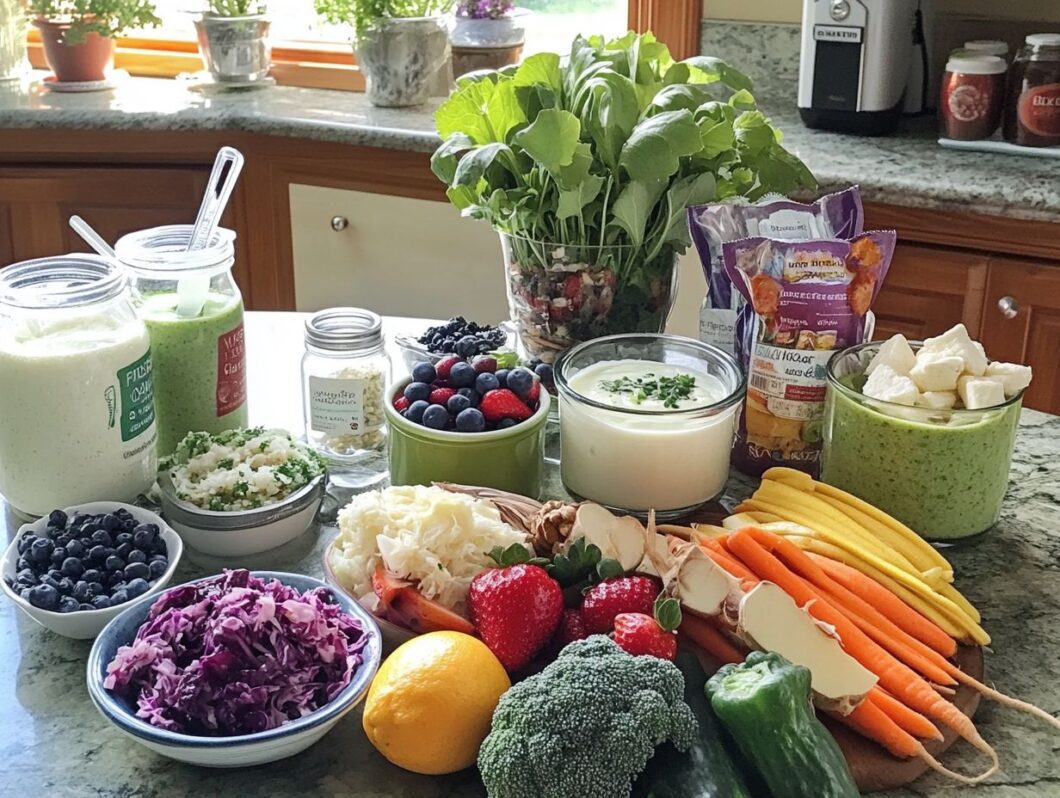In recent years, I have observed an increasing focus on gut health and its significant impact on beauty and overall wellness. This article delves into the connection between a healthy gut and radiant skin, emphasizing how internal health can influence external appearance.
I will outline the signs of an unhealthy gut and provide guidance on effective dietary changes and lifestyle habits to enhance gut health. You will discover the best gut-friendly foods and supplements that contribute to a glowing complexion and improved well-being.
Join me as we embark on this journey toward beauty that begins from within.
Key Takeaways:
The Gut-Beauty Connection

The connection between gut health and skin health is a vital aspect of understanding holistic wellness. Research shows that the gut-skin axis significantly influences how gut health impacts various skin conditions, such as acne, eczema, and rosacea.
Wellness experts like Carla Oates and Kimberly Snyder highlight the importance of maintaining a balanced gut microbiome to enhance overall health and effectively manage skin issues.
By integrating probiotics and prebiotics into my routine, I can not only improve my gut balance but also elevate my skincare regimen by tackling underlying digestive health problems.
Impact of Gut Health on Overall Wellness
I recognize that gut health plays a crucial role in various aspects of overall wellness, including immune health, mental wellness, and inflammation levels.
Maintaining a healthy gut microbiome is essential for efficient nutrient absorption and for supporting a balanced immune system, which is vital in preventing gastrointestinal diseases.
Moreover, I understand that the gut’s influence extends to mental wellness; imbalances in gut bacteria can contribute to mood-related issues.
Therefore, I prioritize adopting wellness strategies that support gut health, as doing so can lead to significant health improvements and enhance overall wellbeing.
How Gut Health Affects Other Areas of Health

I recognize that gut health is intricately linked to various aspects of overall health, including the immune system, levels of inflammation, and mental wellness. Research has demonstrated that maintaining a balanced gut microbiome, which consists of diverse gut bacteria, is essential for nutrient absorption and supports the body’s natural defense mechanisms against diseases.
In fact, studies indicate that specific strains of gut bacteria can enhance immune responses by producing short-chain fatty acids, which help regulate inflammation and strengthen gut barriers. This relationship suggests that a diverse microbiota may better equip the body to combat infections while also managing inflammatory responses effectively.
Additionally, the gut-brain axis underscores how gut health can influence mental wellness, as imbalances in microbiota have been correlated with conditions such as anxiety and depression. I advocate for the consumption of a variety of fiber-rich foods and probiotics to nurture this microbiome diversity, as these nutrients work synergistically to promote overall health.
Signs of an Unhealthy Gut
Recognizing the signs of an unhealthy gut is crucial for addressing potential health issues before they escalate.
I have observed that common indicators include persistent skin conditions such as acne, eczema, or rosacea, which are often linked to gut inflammation and microbiome imbalance.
Additionally, symptoms like irritability, digestive health problems, and fatigue may arise, frequently attributed to leaky gut syndrome.
Understanding these signs give the power tos me to take proactive steps toward improving my gut health and overall wellbeing.
Recognizing Symptoms and Red Flags

Recognizing the symptoms and red flags associated with gut health is crucial for preventing further health deterioration. For instance, skin issues such as acne or rosacea often serve as external indicators of an underlying gut imbalance.
Additionally, symptoms like bloating, irregular bowel movements, and food intolerances can signal struggles within the digestive system.
Understanding the intricate connection between gut health and skin health is essential. Inflammation caused by poor digestion can manifest as rashes or breakouts. Moreover, frequent fatigue, brain fog, and unexplained weight changes may suggest that my microbiome is not functioning optimally.
These signs often serve as urgent calls for me to examine my dietary habits and lifestyle choices more closely.
By recognizing these indicators early, I can implement beneficial dietary modifications and treatments that ultimately improve both my gut health and overall well-being. Taking a proactive approach to these warning signs allows me to significantly enhance my quality of life.
Ways to Improve Gut Health
Improving gut health requires a comprehensive approach that encompasses both dietary changes and lifestyle habits aimed at promoting gut balance.
I focus on incorporating probiotics and prebiotics into my diet to strengthen the gut microbiome. Additionally, I prioritize fiber-rich and fermented foods, as they provide essential nutrients for digestive health.
By adopting a healthy diet and lifestyle, I can significantly influence my overall wellbeing and enhance the diversity of my gut flora.
Dietary Changes and Lifestyle Habits

Dietary changes and lifestyle habits are essential for enhancing gut health and improving the functionality of the digestive system. I recognize that adopting a regimen rich in probiotic supplements and prebiotics can significantly help restore gut flora balance and enhance nutrient absorption.
Incorporating specific food choices into my diet can further support this goal. For instance, I find that including:
- yogurt
- kefir
- sauerkraut
- kimchi
introduces beneficial bacteria that support gut flora. Additionally, I prioritize fiber-rich foods such as:
- legumes
- whole grains
- fruits
- vegetables
as they provide essential prebiotics that nourish these good bacteria. I also engage in regular physical activity and manage stress through techniques like yoga and meditation, both of which are vital for supporting digestive health.
Alongside these habits, I appreciate the role of fermented foods in maintaining a balanced gut environment. For those who may have limited access to these foods or specific dietary restrictions, I understand that supplements can serve as effective adjuncts in promoting gut health.
Gut-Friendly Foods and Supplements
Incorporating gut-friendly foods and supplements into my diet significantly enhances my gut health and overall wellbeing.
I focus on including foods rich in probiotics, such as yogurt and kefir, as well as fiber-rich options like beans and whole grains, which contribute to a balanced gut microbiome.
Additionally, I ensure I consume prebiotics found in garlic, onions, and bananas, as they provide essential nourishment for beneficial gut bacteria, thereby further supporting my digestive health.
Top Foods and Supplements for Gut Health
I focus on incorporating top foods and supplements for gut health, which include a variety of probiotics and prebiotics that help maintain and restore gut balance.
Fermented foods like sauerkraut, kimchi, and yogurt are excellent sources of probiotics, while dietary fiber from fruits, vegetables, and whole grains serves as a prebiotic to nourish beneficial bacteria.
By integrating these elements into my daily meals, I enhance the diversity of my gut microbiome and create a thriving environment for digestion and overall wellness.
Foods rich in omega-3 fatty acids, such as salmon and chia seeds, further support gut health by reducing inflammation and promoting the growth of beneficial microbes. Additionally, garlic, onions, and leeks serve as flavorful enhancements while acting as powerful prebiotics that stimulate the growth of good bacteria.
Crafting balanced, nutrient-dense meals that combine these various food types significantly boosts digestive health, ultimately leading to improved immunity and vitality.
Integrating Gut Health into Your Daily Routine
Integrating gut health into my daily routine is essential for achieving long-term wellness and vitality. I can do this by consciously incorporating probiotics and prebiotics into my meals, emphasizing fiber-rich foods, and adopting effective wellness strategies that promote gut balance.
To seamlessly integrate these elements into my everyday life, I consider meal planning a powerful tool. By preparing balanced meals that include sources of fiber such as fruits, vegetables, and whole grains, I ensure my gut receives the nourishment it needs to thrive.
I also practice mindful eating, taking the time to savor each bite and recognize my hunger cues, which further enhances digestion and fosters a positive relationship with food. Supplementing with high-quality probiotics can help restore beneficial bacteria, especially after taking antibiotics or when I’m experiencing gastrointestinal issues.
Over time, these habits not only support a healthier gut but also contribute to improved mood, enhanced immunity, and overall wellbeing.


